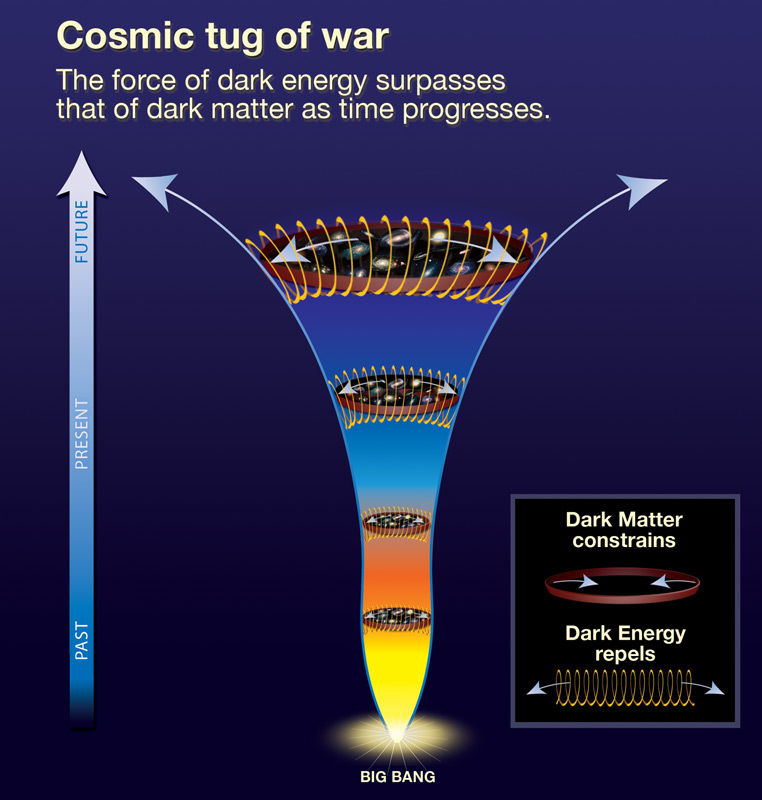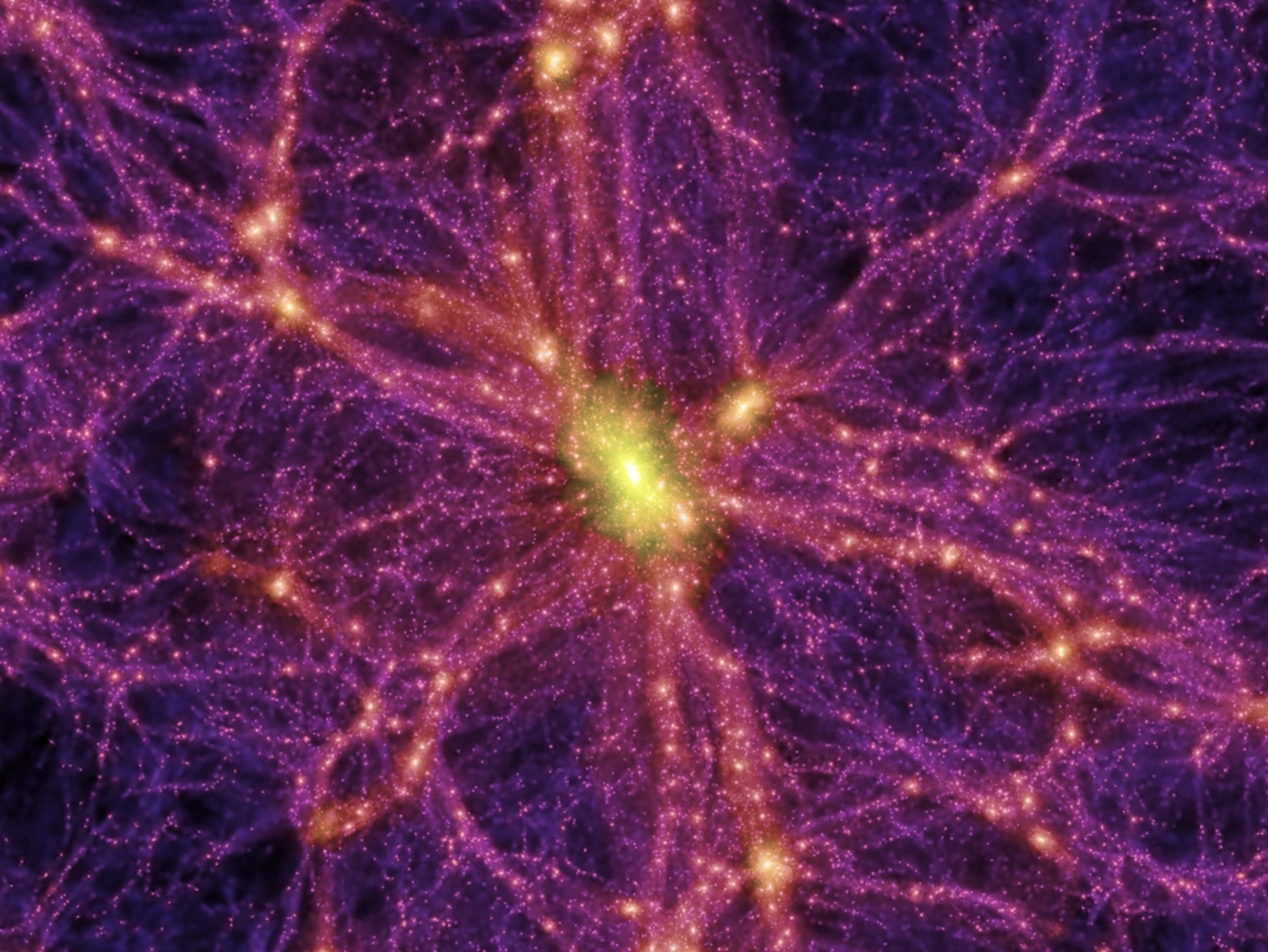
Dark Energy Insights: What the Future Holds for the Universe
Dark energy is a fascinating and enigmatic force that is fundamentally shaping our universe’s expansion. Recent dark energy research has revealed startling insights, suggesting this mysterious energy may not be as constant as previously believed, challenging long-held cosmological studies. The international Dark Energy Spectroscopic Instrument (DESI) collaboration, which includes esteemed researchers from Harvard, has been instrumental in analyzing dark energy’s evolving nature over the past 11 billion years. By utilizing the largest three-dimensional mapping of the cosmos, scientists are uncovering how dark energy’s influence alters the trajectory of universe expansion. As we delve deeper into the complexities of dark energy evolution, we stand on the brink of major revelations regarding the ultimate fate of our universe.
Often referred to as the mysterious force behind the accelerated growth of the universe, dark energy is pivotal in understanding cosmic dynamics. This elusive energy, which drives the expansion of space itself, is being rigorously studied as part of the broader field of cosmology. Recent collaborative efforts, particularly those under the Dark Energy Spectroscopic Instrument (DESI) initiative, are advancing our comprehension of how this phenomenon interacts with matter throughout the cosmos. The implications of these studies extend to our understanding of astronomical structures and the overall architecture of the universe. As astronomers continue to map the universe’s intricate tapestry, they are uncovering the profound effects of this invisible energy on cosmic evolution.
Understanding Dark Energy: The Driving Force of the Universe
Dark energy is a mysterious force that plays a pivotal role in the universe’s accelerated expansion. Cosmological studies have shown that dark energy constitutes about 68% of the universe, yet its nature remains one of the most enigmatic aspects of modern astrophysics. The standard model of cosmology, which describes the universe’s evolution over billions of years, has been predominantly based on the assumption that dark energy is constant. However, recent research suggests that this concept might need revision, as findings from the DESI collaboration indicate that dark energy could be evolving over time.
Understanding the dynamics of dark energy is crucial for predicting the ultimate fate of the universe. Researchers from various institutions are focused on unraveling how this force interacts with matter, influencing the large-scale structure of the cosmos. Studies like those undertaken by the DESI collaboration utilize advanced techniques and extensive datasets to analyze the distribution of galaxies and measure the effects of dark energy across different epochs. The implications of these findings could significantly alter our comprehension of cosmic evolution.
Dark Energy Research: Unraveling Cosmic Mysteries
Dark energy research has become increasingly important as scientists seek to understand its implications for the future of the universe. The data gathered from DESI, which includes a detailed catalog of over 14 million galaxies and quasars, provides unprecedented insight into the structure of the universe and its expansion. Researchers are delving into the properties of dark energy, examining how its influence has changed over the past 11 billion years. This research not only contributes to singular cosmological theories but also aids in forming a more cohesive picture of the universe’s history and evolution.
The global DESI collaboration brings together over 900 researchers from more than 70 institutions, combining expertise from cosmological studies, astrophysics, and data analytics. The collaborative effort has facilitated the development of advanced algorithms and simulations to process and interpret massive datasets, leading to groundbreaking discoveries about dark energy. As scientists explore the evolution of dark energy and its impact on cosmic expansion, their findings could lead to surprising revelations about the fundamental laws of physics governing our universe.
The Evolution of the Universe Through Dark Energy
The concept of dark energy has evolved significantly since it was first introduced, prompting intense scrutiny and investigation in recent years. DESI’s comprehensive analysis utilizes the largest three-dimensional map of the universe ever created to investigate the nuances of dark energy over time. By charting how matter is distributed and the dynamic interaction between dark energy and matter, researchers gain insights into the evolution of the universe. Understanding these interactions is critical for predicting whether the expansion will continue indefinitely or eventually reverse.
Through ongoing studies and comprehensive data collection, researchers are challenging existing paradigms regarding dark energy’s role in the universe’s fate. The Baryon Acoustic Oscillations, which reveal patterns from the universe’s early moments, serve as a crucial tool in these studies. Measuring how these patterns have changed provides a ‘standard ruler’ effect, allowing astronomers to gauge dark energy’s strength and influence in different epochs. Such studies could illuminate the long-standing questions surrounding the universe’s ultimate destiny.
DESI Collaboration: A Global Effort in Cosmological Studies
The Dark Energy Spectroscopic Instrument (DESI) collaboration exemplifies a global commitment to advancing our understanding of the cosmos. With contributions from astronomers, physicists, and data scientists worldwide, DESI meticulously explores dark energy’s effects and its implications for the universe’s expansion. The collaborative network enhances the research process by allowing for the integration of diverse methodologies and perspectives, thus creating a more robust scientific framework.
In addition to investigating dark energy, the DESI collaboration also plays a significant role in exploring related cosmic phenomena, such as galaxy evolution and the cosmic web. By leveraging the immense data gathered, DESI researchers are delving into how galaxies interact and evolve over time, weaving a complex tapestry that illustrates the universe’s structure. The collaborative nature of DESI not only enriches the scientific community but also fosters a spirit of inquiry that fuels future discoveries.
Exploring the Cosmic Web and Structure of the Milky Way
Beyond dark energy studies, the DESI collaboration contributes to broader astrophysical inquiries, notably the exploration of the cosmic web and the structure of our home galaxy, the Milky Way. Understanding the vast networks of galaxies and their relationships provides deeper insights into the formation and development of celestial structures. This knowledge is crucial for contextualizing the behavior of dark energy and its influence on galactic formations.
The cosmic web depicts how galaxies are interconnected, creating large-scale structures shaped by the universe’s expansion and the gravitational influence of dark matter. As DESI continues its observations, the data collected will enhance our comprehension of how dark energy interacts with these structures over time. Researchers aim to construct a clearer framework of how the universe operates, shedding light on the fundamental principles that govern all cosmic phenomena.
Implications of Dark Energy on Universe Expansion
The implications of dark energy on universe expansion are profound and far-reaching. As the critical driver of accelerated expansion, dark energy poses critical questions regarding the universe’s future. DESI’s investigations have revealed nuances in how dark energy may not be static but instead evolving, suggesting a dynamic interplay between this enigmatic force and the matter in the cosmos.
This evolving nature of dark energy could hold answers to some of the most pressing questions in modern cosmology. For example, will the universe continue to expand at an accelerating rate, or will gravitational forces eventually take over? The research being conducted through DESI is pivotal in unraveling these mysteries, reshaping our understanding of how the universe has changed through time and what that may ultimately mean for its fate.
Baryon Acoustic Oscillations: A Key to Understanding Cosmic Expansion
Baryon Acoustic Oscillations (BAOs) serve as critical landmarks in the quest to understand cosmic expansion and the role of dark energy. These oscillations, resulting from pressure waves in the early universe, imprint a distinct pattern in the distribution of galaxies. By identifying and measuring these patterns across vast distances, researchers can gauge how the universe has expanded over time and how dark energy factors into this process.
The DESI collaboration’s focus on BAOs provides an invaluable tool for researchers to map out the universe’s expansion history. By analyzing variations in these acoustic patterns over different cosmic epochs, scientists can discern the influence of dark energy at various times. This research not only aids in confirming existing theories but also paves the way for new insights into the fundamental workings of the universe.
Future Directions: The Role of DESI and Dark Energy in Astrophysics
As the DESI collaboration continues to gather and analyze cosmic data, the future directions of dark energy research appear promising and transformative. The collaboration’s expansive dataset, which includes millions of celestial objects, will enable ongoing investigations into not just dark energy but also galactic formations and cosmic structures. This abundant information acts as a cornerstone for future astrophysical research, providing a platform for relentless exploration of the universe.
With the continuous advancements in technology and methods, the potential for new discoveries regarding dark energy is immense. The field is ripe for innovation as researchers seek to refine their understanding of how this dimensionless force influences the universe. The future of DESI and its findings will likely illuminate the path to solving longstanding questions in cosmology, potentially reshaping our comprehension of both the universe and the laws that govern it.
Public Engagement and Education through DESI Collaboration
The importance of public engagement and education in the realm of dark energy research cannot be overstated. The DESI collaboration actively fosters a culture of outreach, ensuring that findings and advancements are accessible not only to the scientific community but also to the general public. Through organized presentations, interactive materials, and educational programs, they aim to inspire the next generation of astronomers and scientists.
By sharing dark energy discoveries and their implications for the universe, the DESI collaboration encourages curiosity and engagement with complex scientific topics. Programs led by researchers, such as public talks and resources designed for educational institutions, help demystify cosmic phenomena. This commitment to outreach underscores the collaborative effort’s goal of not only advancing scientific knowledge but also inspiring a broader understanding of the intricate universe we inhabit.
Frequently Asked Questions
What is dark energy and why is it important in cosmological studies?
Dark energy is a mysterious force believed to be responsible for the accelerated expansion of the universe. It comprises approximately 68% of the universe’s total energy content, playing a crucial role in determining the fate of the cosmos. Understanding dark energy is essential for cosmological studies as it influences how galaxies evolve and the overall structure of the universe.
How does the DESI collaboration help in dark energy research?
The Dark Energy Spectroscopic Instrument (DESI) collaboration enhances dark energy research by creating the largest 3D map of the universe. By analyzing the distribution of over 14 million galaxies and quasars, DESI provides insights into the influence of dark energy over the past 11 billion years, helping scientists refine models of universe evolution.
What recent findings have emerged from dark energy research through the DESI project?
Recent findings from the DESI project suggest that dark energy may be weakening over time, challenging the traditional view that it is a constant force. This revelation, derived from data analyzed during the first three years of DESI’s operations, indicates a potential need to update existing cosmological models regarding universe expansion.
How do Baryon Acoustic Oscillations relate to dark energy’s effects?
Baryon Acoustic Oscillations (BAOs) are patterns created by sound waves in the early universe that serve as ‘standard rulers’ for measuring cosmic distances. They are influenced by dark energy, as changes in the expansion dynamics affect the size of these oscillations over time. Analyzing BAOs allows researchers to better understand the strength and evolution of dark energy.
What role do researchers at Harvard play in the DESI collaboration?
Researchers at Harvard play a crucial role in the DESI collaboration by contributing to data analysis, developing algorithms and simulations, and interpreting cosmological results. Their efforts enhance the understanding of dark energy and the universe’s structure, making significant advancements in astrophysical research.
What implications do the latest dark energy results from DESI have for the future of the universe?
The latest dark energy results from DESI imply that the universe’s expansion might be evolving in unexpected ways, potentially altering our understanding of its fate. As dark energy influences cosmic dynamics, these findings could lead to a revised outlook on the long-term evolution of the universe.
How can the public access the data from recent dark energy studies conducted by DESI?
The public can access the data from the recent dark energy studies conducted by DESI through their Data Release 1, which includes comprehensive details about millions of celestial objects. This data is available for exploration on platforms like arXiv, promoting further research and engagement with astrophysical studies.
Why is understanding dark energy crucial for galaxy evolution studies?
Understanding dark energy is vital for galaxy evolution studies as it influences how galaxies are formed and interact within the expanding universe. By investigating dark energy’s effects, researchers can gain deeper insights into the cosmic web’s structure and the ongoing processes shaping galaxies over time.
What advancements in dark energy research were discussed at the American Physical Society’s Global Physics Summit?
At the American Physical Society’s Global Physics Summit, researchers presented the latest discoveries related to dark energy from the DESI collaboration, highlighting the implications of their findings on the universe’s expansion and the collaboration’s ongoing work in improving understanding of cosmological dynamics.
| Key Points | Details |
|---|---|
| Dark Energy Role | Considered a driving force behind the universe’s accelerated expansion. |
| DESI Collaboration | An international effort involving over 900 researchers from more than 70 institutions. |
| Research Findings | Indicates that dark energy may be weakening over time, challenging the standard cosmological model. |
| Data Analysis | Analyzed 3D maps and over 14 million galaxies to track dark energy over 11 billion years. |
| Significance of Baryon Acoustic Oscillations | Patterns in matter distribution serve as a standard ruler for cosmic expansion studies. |
| Future Research | Findings will enhance understanding of galaxy evolution and the cosmic web. |
Summary
Dark energy plays a pivotal role in our understanding of the universe’s expansion. Recent findings from the DESI collaboration suggest that it may be evolving over time, prompting a re-evaluation of the current cosmological model. These revelations highlight the dynamic nature of dark energy and underscore the importance of continued astrophysical research to unravel the mysteries of the cosmos.


